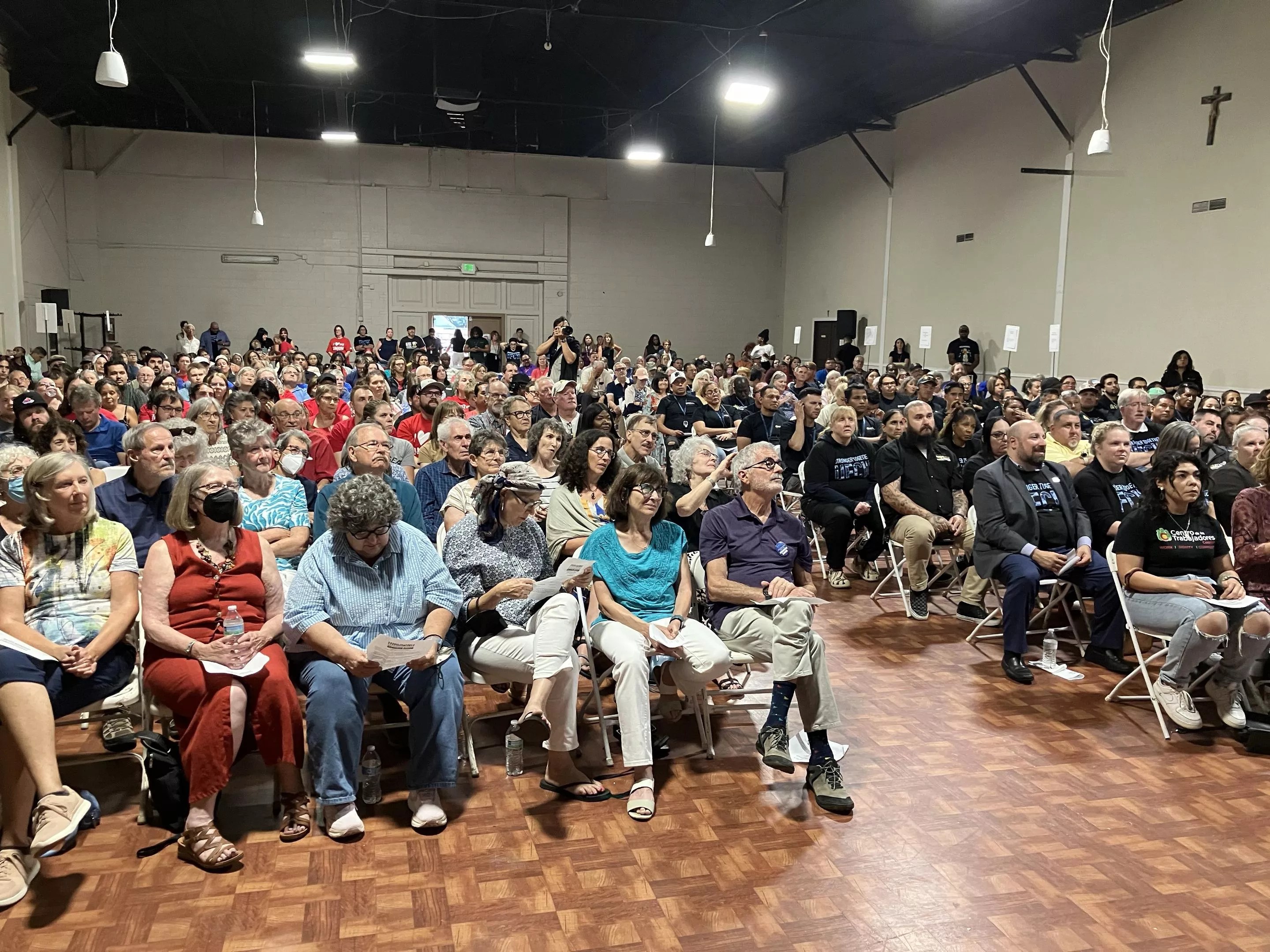
Coloradans for the Common Good

Audio By Carbonatix
A tenet that all leaders with Coloradans for the Common Good are taught early in their training is that there are two poles of power in our society: organized people and organized money. At CCG’s Fifth Anniversary Celebration and Action on July 18, that principle was on vivid display in words and actions.
Some 300 representatives from 25 member institutions and about 20 of CCG’s allies and guests packed the parish hall at St. Joseph Catholic Church for the occasion. CCG leaders knew every one of those “organized people” because of our diligent work on turnout. We also know if an organization can mobilize well-informed and disciplined people to solve problems, it will always be taken seriously. The event was co-chaired by Reverend Chris Gilmore, lead pastor at Sixth Avenue United Church of Christ, and Vicki Flores, executive director of Jeffco Education Support Professionals Association (JESPA).
An important part of the program was to celebrate our victories over the past five years. Amie Baca-Oehlert, former president of the Colorado Education Association and the new co-chair of CCG, laid out some of the highlights. In its first five years, the organization:
• Won pandemic workplace protections for 50,000 grocery store workers throughout the state and for the packinghouse workers in Greeley,
• Pushed Denver City Council and Mayor Mike Johnston to put $30 million into the emergency rental assistance, protecting 6,000 families from eviction,
• Changed city law to give the Denver Auditor’s Office the authority to investigate employers who steal wages and take advantage of our most vulnerable workers, and
• Succeeded in getting an $18-an-hour minimum wage for paraprofessionals in Jefferson County Public Schools and $20 per hour for Denver Public Schools paraprofessionals – some of the highest wages for paraprofessionals in the country.
Raising “organized money” was also a key to our success. CCG leaders knew that if we could raise most of the funds to cover our budget – generating so-called hard money – it would give us the freedom to choose the issues we wanted to tackle. CCG leaders refuse to take dark money. Commitments also were made from local organizations to finance the expansion of CCG’s organizing capacity in Jefferson, Adams, Boulder, Larimer, and Weld counties.
Part of any CCG action is inviting our leaders to tell their personal stories about how they were changed through their work.
Claudia Meza, a leader at Centro de Los Trabajadores, spoke about how she turned her anger at hearing immigrant workers’ stories about wage theft into something powerful. Claudia said she learned skills to participate in an organizing campaign that convinced Denver City Council members to pass a wage-theft ordinance. She said that experience has given her a new sense of dignity.
Rabbi Katie Mizrahi of B’nai Havurah, Denver’s Jewish Reconstructionist Congregation, spoke about the importance of CCG’s Interfaith Labor Seder. It reminded her and B’nai Havurah members of the Jewish tradition of supporting workers’ rights. She also said it was particularly important to have significant relationships with CCG’s diverse community given the turmoil in Israel and Gaza.
Zander Kaschub, a food service supervisor in the Jeffco school district, shared his frustration in trying to get healthier food served for students in the cafeteria. He said being mentored by CCG organizers and other leaders gave him the confidence to confront Jeffco school board candidates at a CCG-sponsored forum that had the largest turnout of any gathering in the election. Zander said that experience transformed him from a discouraged worker to having the certainty to become the president of JESPA.
CCG is run by a collective of nonpartisan leaders from institutions in the faith, civic and organized labor sectors. All member organizations pay dues to CCG. Leaders emerge from CCG to fight for action on issues they hear about from one-to-one meetings and that affect them personally, infusing the work with the kind of passion and deep-seated conviction that lead to success in solving often stubborn, intransigent problems.
In the next five years, CCG is committed to continued growth and activism and to becoming an even more powerful voice for the common good along Colorado’s Front Range.
Zeik Saidman is a founding leader of Coloradans for the Common Good and a member of B’nai Havurah.
Westword.com frequently publishes commentaries on matters of interest to the community. Have one you’d like to submit? Send it to editorial@westword.com, where you can also comment on this piece.